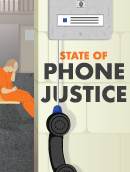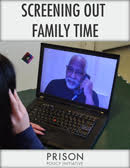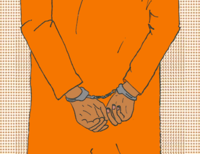HELP US END MASS INCARCERATION
The Prison Policy Initiative uses research, advocacy, and organizing to dismantle mass incarceration. We’ve been in this movement for 23 years, thanks to individual donors like you.
Can you help us sustain this work?
Thank you,
Peter Wagner, Executive Director Donate
Can you help us sustain this work?
Thank you,
Peter Wagner, Executive Director Donate
Communication
Rather than encouraging people in prison to stay in contact with their loved ones, prisons and jails frequently restrict communication — and even partner with private companies to exploit families trying to stay in touch. We’re exposing these abusive practices and fighting back.
Below is some of our key research and organizing. (See also our related organizing around preserving face-to-face family contact in prisons.)
Campaigns
 Regulating the prison and jail phone industry
Regulating the prison and jail phone industry
Families still pay exorbitant rates just to stay in touch with their incarcerated loved ones, while companies rake in huge profits and develop new ways to squeeze money out of those who can least afford it. Protecting postal mailIncreasing prices and and efforts to eliminate physical mail threaten a vital connection between incarcerated people and their families. Through research and advocacy we're fighting back.
Protecting postal mailIncreasing prices and and efforts to eliminate physical mail threaten a vital connection between incarcerated people and their families. Through research and advocacy we're fighting back. Protecting in-person visits from the predatory “video calling” industry
Protecting in-person visits from the predatory “video calling” industry
We uncovered how jails collude with telecom companies to eliminate human contact, by replacing in-person visits with expensive, low-quality video chats. Our research and campaign is helping preserve face-to-face visits. Investigating electronic messaging and tablets in prisons
Investigating electronic messaging and tablets in prisons
Prisons and jails are partnering with private companies to offer email services, but there’s a catch: The companies charge incarcerated people for every message they send. We're staying ahead of these profiteers by exposing the hidden costs in their digital offerings.
Briefings
- Breaking news from inside: How prisons suppress prison journalism, by Brian Nam-Sonenstein, June 15, 2023
Building on data from the Prison Journalism Project, we find that most states enforce restrictions that make practicing journalism extremely difficult and sometimes risky. - Both sides of the bars: How mass incarceration punishes families, by Leah Wang, August 11, 2022
New data shows that, with 1.2 million minor children with a parent in state prison, mass incarceration causes generational harm. - Research roundup: The positive impacts of family contact for incarcerated people and their families, by Leah Wang, December 21, 2021
We've rounded up over 50 years of empirical evidence that visitation, mail, phone, and other forms of contact between incarcerated people and their families have positive impacts for everyone — including better health, reduced recidivism, and improvement in school.
 Regulating the prison and jail phone industry
Regulating the prison and jail phone industry Protecting postal mail
Protecting postal mail Protecting in-person visits from the predatory “video calling” industry
Protecting in-person visits from the predatory “video calling” industry
 Investigating electronic messaging and tablets in prisons
Investigating electronic messaging and tablets in prisons


